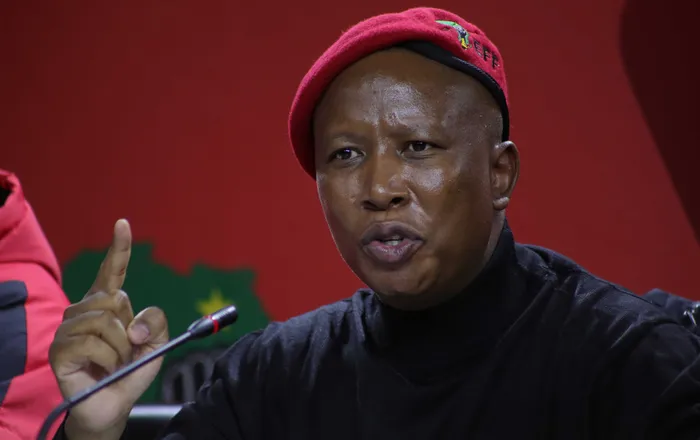Coalition discussions to intensify ahead of 2024 elections

EFF leader Julius Malema earlier this month said that the EFF was open to working with the ANC in KwaZulu-Natal and Gauteng, despite his party being behind the motion to remove President Cyril Ramaphosa from his position over the Phala Phala farm scandal. File Picture: EFF leader Julius Malema. Picture: Timothy Bernard African News Agency (ANA)
Durban - The next national general elections may be two years away but political parties are increasingly making it known that they will be open to coalition discussions, even if it means joining forces despite ideological differences.
EFF leader Julius Malema earlier this month said that the EFF was open to working with the ANC in KwaZulu-Natal and Gauteng, despite his party being behind the motion to remove President Cyril Ramaphosa from his position over the Phala Phala farm scandal.
Malema said his party had been approached by the newly elected leadership in the provinces, requesting a meeting to discuss the possibility of forming coalition governments, including the governing of municipalities. Malema said they would not ignore coalition discussions as they wanted the best services for the community.
In KZN, the IFP may also look at coalition discussions with the ANC. The relationship between the two parties when Sihle Zikalala was premier was tetchy at best but again there is new leadership in the province although the issue of the fate of the Ingonyama Trust may prove to be a stumbling block.
In February 2021, DA leader John Steenhuisen opened the door to a possible coalition with the ANC should there be a stalemate in the 2024 elections but only if Ramaphosa was still its leader.
Steenhuisen had said that the DA would be open to going into a governing coalition with Ramaphosa and like-minded ANC leaders.
Steenhuisen said his party was anticipating an eventual split in the governing party, which would allow for those who share the same values as the official opposition to come together.
However, Steenhuisen has condemned Ramaphosa for the Phala Phala farm scandal and any talk of coalition has been put on hold until the scandal’s unanswered questions have been resolved.
Parties that enter into coalition agreements will be wary of agitating voters and will recall the doomed coalition between Agang SA leader Mamphela Ramphele and then DA leader Helen Zille in 2014.
Just days after an announcement that Ramphele was joining the DA and standing as its presidential candidate, there was a massive fallout that cost Ramphele her political career.
Political analyst Ralph Mathekga said that this incident revealed that political elites need to be careful when making pacts that are not palatable to voters.
“Things have changed since this happened and now there are multiple centres in society that have neutralised the power of elites in coalitions.
“There are repercussions if elites decide to simply enter into coalitions as there are multiple centres of power in society and this has neutralised the power of elites in coalition agreements.”
Another analyst, Professor Bheki Mngomezulu, said the country’s major political parties would have no choice but to enter into coalitions ahead of the next elections.
“The traditional parties have been gradually losing support as independent candidates and new political parties get into the mix.
“The top three political parties cannot run the country on their own and therefore coalitions are inevitable,” Mngomezulu said.
Related Topics: